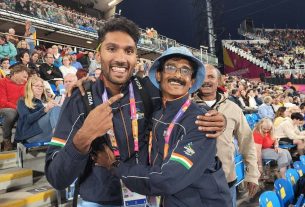Rahi Sarnobat is the first in her event to book a spot for Tokyo Olympics next year.
Thank you for reading this post, don't forget to subscribe!Shared News| Updated: May 28, 2019 8:40:46 am
Rahi Sarnobat clinched 25m gold at Munich World Cup.
Rahi Sarnobat exuded calm as she smiled for the cameras after the women’s 25m pistol final at the Munich World Cup. There was no jump for joy at winning her first gold medal at a shooting World Cup in six years, nor was there any glimmer of excitement after earning the country’s first quota in the event for the Tokyo Olympics next year. All she had on her face, with every word of congratulations offered to her, was that simple smile.
In many ways, it was a fitting celebration from the 28-year-old. For it is her ability to remain nerveless during a final that is her greatest ally. On Monday, in a strong field that competed at the event in Munich, the Kolhapur native kept her emotions in check to win the final with a score of 37 — just one more than second-placed Olena Kostevych of Ukraine. It is in high-pressure finals of the 25m pistol event itself that she exudes the most confidence in her game.
Back in August, at the Asian Games in Indonesia, Sarnobat won gold after overcoming the pressures of a shoot-off for the title. Poised at 34-34 against Naphaswan Yanpaiboon of Thailand, the Indian markswoman won the yellow metal with a 3-2 score in the shoot-off.
All the while though, she asserted that she was confident of the win just by getting to the final. “Finals I’ve always been good at, you can call it my mastery,” she told The Indian Express at the time. “My finals are always better than my qualification. But I like finals because I treat it as a second chance I’ve got to re-do my technique. If I reach a final, it’s like I was meant to get a medal.”
- EXPLAINED
What this win means for Rahi
Rahi Sarnobat’s first World Cup gold medal in five years has earned India a seventh quota for shooting at the Tokyo Games. This was, however, the biggest win for women’s pistol shooting since Heena Sidhu won the World Cup Finals at the same venue in 2013. Indian shooting has so far earned the country four Olympic medals, yet none have come from women pistol shooters – which has predominantly been dominated by competitors from China, South Korea, Russia and the former Soviet republics. In Munich, considered one of the most prestigious and competitive World Cups, Sarnobat came up against a strong field which included Ukraine’s Olena Kostevych, the 2004 Olympic champion who won silver on the night, multiple World Cup medallist Antoaneta Boneva of Bulgaria, and youngster Doreen Vennekamp of Germany who won bronze at the World Championships last year and had already booked an Olympic quota for Tokyo. There was also reigning Olympic champion Anna Korakaki of Greece competing at the event. Sarnobat had first announced herself by winning gold at the 2010 New Delhi Commonwealth Games – when she was only 18 – and then retained her title four years later in Glasgow. But she was forced to leave the sport in 2014 after breaking her elbow in a fall. She took over a year to make a return – spending seven months in rehabilitation. Sailing largely under the radar, she became the first Indian woman to win gold in an individual pistol event at the Asian Games last year. Now with her win in Munich, she remains relevant nine years after her breakthrough.
Getting past the qualification stage though has been her problem. Sarnobat has now competed in 27 senior-level World Cups but made it to the final stage on only six occasions. From those six though, she has medalled three times — a bronze at Fort Benning in 2011, gold at Changwon in 2013, and now champion in Munich.
On the day though, she recorded a score of 586 in the qualification round – her second-highest score at this stage in a World Cup – to finish fourth and progress to the final. Thereon, not once did the 2010 and 2014 Commonwealth Games gold medallist fall below the joint-third position.
In fact, so solid was her shooting that she was the only player to have shot five successful hits in two successive series – in the 25m event final, a shot is considered a ‘hit’ only with a score of 10.2 or above, and each series consists of five shots. Those successful shots came in the eight and ninth series and gave her a one- point lead over the Ukrainian ahead of the last one — both Sarnobat and Kostevych would get three hits each in the decider, giving the Indian the gold.
The achievement brings Sarnobat back into the limelight in a career that has been marked by rises, falls because of her qualification problem, a lengthy injury absence, and a few path-breaking wins. She was the first Indian woman shooter to book a spot at the London 2012 Olympic Games. Last year, she became the first Indian woman pistol shooter to win an Asian Games gold in an individual discipline.
Now she’s the first in her event to book a spot for Tokyo next year.
Bhaker’s gun malfunction
Seventeen-year-old Manu Bhaker too had qualified for the women’s 25m pistol final along with Sarnobat, and had made a promising start. By the end of the sixth series, Bhaker had a score of 21 which kept her in joint-first position with Sarnobat and Kostevych, and was well in the running for a medal and a quota spot for the Tokyo Olympics. In the seventh series though, the teenager’s pistol started to malfunction. Despite an official checking her weapon, Bhaker’s gun remained jammed and she was forced to withdraw from the competition, eventually finishing fifth.


